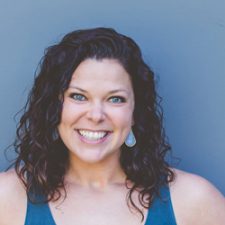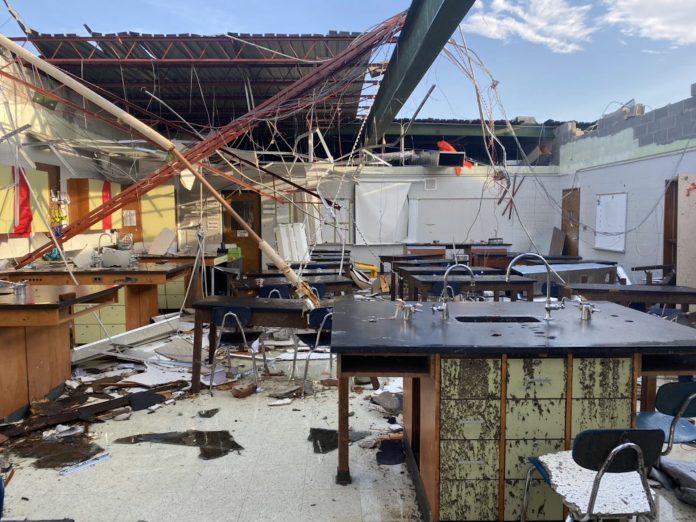Recover Wilson represents a coordinated effort for tornado recovery in Wilson County, comprising churches and other nonprofit groups in Mt. Juliet, Lebanon and other communities.
Few Middle Tennesseans know the long haul of disaster recovery more than Regina Girten.
Girten, outreach pastor at Providence United Methodist Church in Mt. Juliet, is a native of New Orleans. She lived through back-to-back Hurricanes Katrina and Rita in 2005.
Now she’s co-chairing Recover Wilson, a group put together to help lead relief and recovery efforts in Wilson County in the aftermath of the deadly and destructive tornadoes of March 3.
Three people died and 23 were hurt from a powerful tornado that tore through parts of Mt. Juliet and Lebanon, damaging numerous schools, large warehouses, industrial buildings and manufacturing facilities. In all, more than 1,300 structures were damaged or destroyed.
You would forgive Regina Girten for a feeling of déjà vu.
Scenes from New Orleans and the Gulf Coast remain the stuff of collective nightmares: The city’s Ninth Ward and many other parts of the city submerged by floodwaters. Residents plucked to safety from their rooftops. The Superdome overwhelmed by the displaced and desperate.
Girten’s family home was heavily damaged, part of the devastation that killed more than 1,800 people and caused an estimated $100 billion in property damage.
Her family displaced first to Charleston, South Carolina, then eventually to a small rental home in New Orleans for two years, They soon realized the homeowners insurance was too little, too late to adequately rebuild their house.
Her family eventually sold their home to a construction company for a little more than half of its value. Her family bought another house and relocated to another nearby parish.
Her New Orleans experience wasn’t lost on Girten after the tornado hit Wilson County.

“I knew that mobilizing community leaders in a way we may not normally mobilize would be very important,” Girten told The Community Foundation, “and I knew that a long-term recovery relief team would be necessary to ensure all community members received sustainable, holistic and equitable care.
“I had seen the system break down and know that even today New Orleans never fully reached recovery,” she continued. “The hope in a natural disaster is that you are able to meet the immediate relief needs in real time, but then have a common assessment of needs for community members so that along the way case managers can in a consistent way serve community members.
“I just was not entirely sure how to do that,” Girten acknowledged. “This is why I have been so grateful to so many organizations, churches and community leaders who have been willing to come together to gain the wisdom and knowledge from other long-term disaster relief and recovery organizations.”
Thus, Recover Wilson was born.
“Recover Wilson came about when First Baptist Church Lebanon pastor and co-chair of the former Recover Lebanon Mr. David Freeman and then co-chair of the Mount Juliet Recovery Team Ms. Regina Girten, decided they could be more effective and accomplish more by working together,” Mayor Randall Hutto told The Community Foundation. “Their abilities to pull together resources, manpower and data benefited all residents of Wilson County directly or indirectly. Their spirit and diligence to put others first has been remarkable.”
The process of rebuilding Wilson County has been methodical.
“There’s a whole language behind disaster recovery that I had no idea about,” Girten said. “I am not sure most do. Even when you’ve been affected by a natural disaster, you may see the gaps … but you are not sure how they are supposed to be filled.
“We are slowly together piecing together that puzzle,” she continued “We just do not entirely know what the picture of the puzzle looks like. Each day we are stepping closer and closer to gathering all the correct people around the table, and I’m grateful for how many have worked tirelessly to make that possible.”
“We hope they continue to establish a foundation that has built a team that can tackle any obstacle Wilson County may face,” Hutto remarked when outlining the plan for recovery. “They are a small army, ready for battle to help the citizens of Wilson County through the good times and bad. Their goal is to fulfill the greatest two commandments in the Bible; love the Lord, your God with all your heart, soul and spirit and love your neighbor as yourself. They will make the citizens of Wilson County strong physically, mentally and spiritually in the midst of the storm.
“Out of the storms came a beautiful rainbow called Recover Wilson.”
Recover Wilson’s Girten recently answered questions from The Community Foundation
CFMT: In light of changes in how we all live and work due to the COVID-19 pandemic, how is your organization managing to work in supporting tornado recovery efforts?
RW: This one has been difficult. Initially, we were able to be out in the neighborhoods, listening to stories and beginning to gather together our assessments of current needs, anticipate future ones, etc. We were able to send large work groups out, and COVID-19 halted a lot of those efforts. Our team then all had to individually secure their family members in a very new rhythm and then continue on in the work.
We never stopped providing emergency needs that came our way, and Mayor Hutto and MJPD (Mt. Juliet Police Department) really helped me to oversee that as I regrouped my church’s outreach ministries to comply with COVID-19 and got my home set up to shelter in place.
We’ve also had the challenge of not initially knowing who was in charge. And I’ve learned that the answer in natural disaster is … no one. Everyone is in charge, and everyone has to collaborate and work together.
Another challenge has been educating ourselves and allowing everyone time to digest that knowledge in order to see the big picture. … It is not a sprint: It’s a marathon. It has to be intentional and careful work … if you move too quickly, you can inadvertently harm an affected community member. It has been difficult to communicate with the entire group of affected community members. In natural disaster … you can’t just go knock on the door of home, because there’s no door.
This is why the communication plan we’re organizing will be really important and assist in reaching a larger percentage of survivors. I would think our entire team would say that we’ve stumbled along the way, but we are getting there and really learning sustainable ways to serve our community well.
An additional challenge is finding the right people to be at the table. We ARE conquering this challenge and have been faithfully reaching into our social networks to find the additional people we need at the table. We have found some amazing connections in organizations like: The Community Foundation of Middle Tennessee, Community Resource Center, Westminster Home Connection, Compassionate Hands, Salvation Army and United Methodist Committee on Relief, to name a few!

CFMT: Give a favorite example or two of your staffers or volunteers stepping up to make a difference to help people through these disasters.
RW: Two stories come to mind … they were key moments in mobilizing leaders together to continue sustainably serving in the long haul.
In the beginning of this journey, Officer Tyler Chandler with MJPD created a portal for me and our Mt Juliet Recovery Group. (This was before we were able to mobilize into one Recover Wilson group.) In the blink of an eye, Officer Chandler created a website for community members to submit their various needs. It was dumping into an Excel document and then myself and Amber Nutten, a pastor at Connect Church, began to copy and paste out those various needs to the nonprofits, counseling centers, churches and organizations providing those needs.
We knew that long term, we would eventually pass this portal off to a long-term disaster relief team to assist us with case management. We merged into Recover Wilson within the first three weeks, and that portal began to serve community members in all affected zip codes in the county. When Compassionate Hands received their grant, they hired two employees and their employee, Leslie Williams, helped us clean up that document to then pass off to Tornado Recovery Connection (615-270-9255) to move forward with case work.
That was a great day, because we felt like the original intent of that portal was moving on to the next step in seeking to serve our community. Amber Nutten and her team worked tirelessly in the onset of that portal, while simultaneously hosting 8 Days of Hope, a disaster relief team, sending out teams to provide construction and debris removal assistance for community members. The work that Amber and the Connect Church team did was beautifully representative of what being a caring community members is all about. All the while … the opening of their brand new sanctuary was coming up just two weeks after the tornado!
The second story is the morning when Mayor Hutto text-messaged me and Amber Nutton as representatives from the Mount Juliet Recovery Team and [Launchpoint Church’s] Angela Kubic and Pastor David Freeman as representatives from the Lebanon team. Mayor Hutto gathered us together to initially be points of community on down to our various teams. But, it was in that meeting with Mayor Hutto where we realized it made more sense to merge into one team: Recover Wilson.
Mayor Hutto’s leadership and willingness to mobilize and work alongside us have been incredibly appreciated. His concern for our community is great, and it was a glory sighting the day we were able to all come together as one Wilson County family. Natural disasters are sad, but these mobilization efforts truly afford us space to build bridges together and enrich the ways in which we serve our community together.
CFMT: In terms of tornado relief and recovery, what needs remain in your community or communities?
RW: We have a long way to go. Direct service organizations like Mt. Juliet Help Center are seeing a large increase in needs for basic needs like utilities. The Family Resource Center for Wilson County Schools has seen more people coming for food … this is as a result of the tornado and COVID-19. Community members are living off their savings right now and are running out, if they have not already. And our relief efforts will include COVID-19, because it is a part of the mathematical equation that exists for our community to reach recovery.
We have begun to see, and we will see more of, survivors finding that funding gap between what they have and what they need to complete their home. Just like my family’s story, however, those needs won’t necessarily appear until 6 to 18 months from now. I remember my family not thinking we needed help until suddenly we did. That is why taking the intentional time to ensure our team is set up the way it needs to be is vital.
CFMT: Define the word “hope” for you and your organization.
RW: Hope is the presence of trust: a trust that does not erase anxiety, stress, uncertainty or fear but calms the waters to remind ourselves that we have an expectation and desire for a certain thing to happen. We have hope our community will not only recover but will be resilient. We can supersede where we were before if only we trust the process.
We have hope in the process. We have hope in one another. And ultimately we have hope in God.